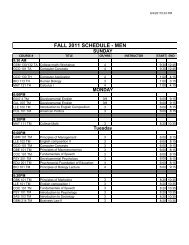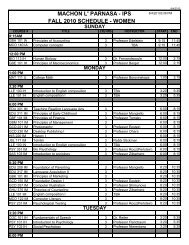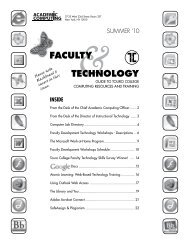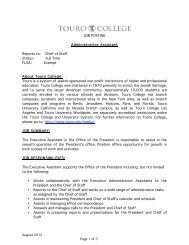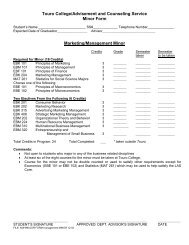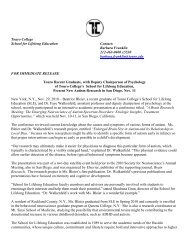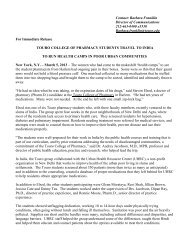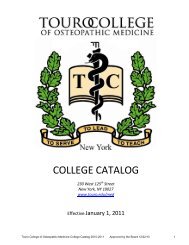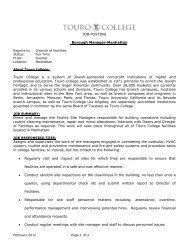Making the World a Better Place - Touro College
Making the World a Better Place - Touro College
Making the World a Better Place - Touro College
You also want an ePaper? Increase the reach of your titles
YUMPU automatically turns print PDFs into web optimized ePapers that Google loves.
Listening with His WHOLE Being<br />
Bobby Staley MSW ‘08<br />
Bobby Staley has a reputation for<br />
tackling <strong>the</strong> toughest social work cases.<br />
The dedicated mental health clinician has<br />
worked with challenging populations,<br />
including HIV patients, <strong>the</strong> formerly<br />
incarcerated, and now <strong>the</strong> severely<br />
mentally ill.<br />
Recently, Staley met with a client who had cut his hand<br />
with a knife, damaging <strong>the</strong> tendons so badly that<br />
surgery was required. After missing a couple of<br />
important appointments, <strong>the</strong> patient said,<br />
“Don’t worry about it. Let <strong>the</strong>m cut my<br />
hand off.”<br />
Instead of resignation, Staley heard<br />
frustration, sensing that <strong>the</strong> client hadn’t<br />
actually meant what he said. Ra<strong>the</strong>r than<br />
allowing <strong>the</strong> client to give up, Staley was<br />
patient and persistent, finally convincing <strong>the</strong><br />
patient to get <strong>the</strong> help he needed. Of his<br />
approach, Staley says, “You don’t just listen<br />
verbatim. You listen with your whole being.”<br />
On any given day, that’s exactly what<br />
Staley does in <strong>the</strong> South Bronx, as<br />
assistant director of The Bridge, Inc.’s<br />
Assertive Community Treatment (ACT)<br />
team, a modality that provides <strong>the</strong>rapy, medical and support<br />
services to <strong>the</strong> severely mentally ill. He helps clients fulfill<br />
basic tasks, such as finding housing, going to work, visiting<br />
<strong>the</strong> doctor, doing <strong>the</strong>ir laundry and even visiting social clubs.<br />
The Bridge, Inc.’s ACT client population benefits from <strong>the</strong><br />
organization’s team approach, where a host of<br />
professionals—a case manager, a psychiatrist, two nurse<br />
practitioners, three social workers and two housing<br />
specialists—develop treatment plans for <strong>the</strong> 68 individuals<br />
<strong>the</strong>y serve. As a social worker, Staley takes a hands-on<br />
approach to monitoring <strong>the</strong>ir progress. “If<br />
buying a sandwich for someone means that<br />
<strong>the</strong>y’ll stay at <strong>the</strong>ir medical appointment, that’s<br />
what we’ll do,” says Staley. “We look after <strong>the</strong><br />
little things.”<br />
But, as Staley knows, for this particular<br />
population, even <strong>the</strong> so-called “little things”<br />
can feel like Herculean tasks. “This job gives<br />
me an opportunity to better understand what<br />
it’s like to have a severe mental illness,” he<br />
says. “To use a military metaphor, our team is<br />
like <strong>the</strong> ‘special forces of working with <strong>the</strong><br />
mentally ill’.”<br />
If anyone is equipped for <strong>the</strong> ‘special<br />
forces,’ it’s Staley. Steven Huberman, Ph.D.<br />
and founding dean of <strong>Touro</strong>’s Graduate School of Social Work<br />
(GSSW) was Staley’s advisor when he was pursuing his<br />
graduate degree in social work. Dean Huberman says of his<br />
former student, “Bobby always would take on <strong>the</strong> most<br />
challenging responsibilities in <strong>the</strong> most quiet, humble ways.<br />
He has consistently self-selected <strong>the</strong> most difficult populations<br />
to work with.”<br />
18 TOURO LINKS I SPRING 2013



